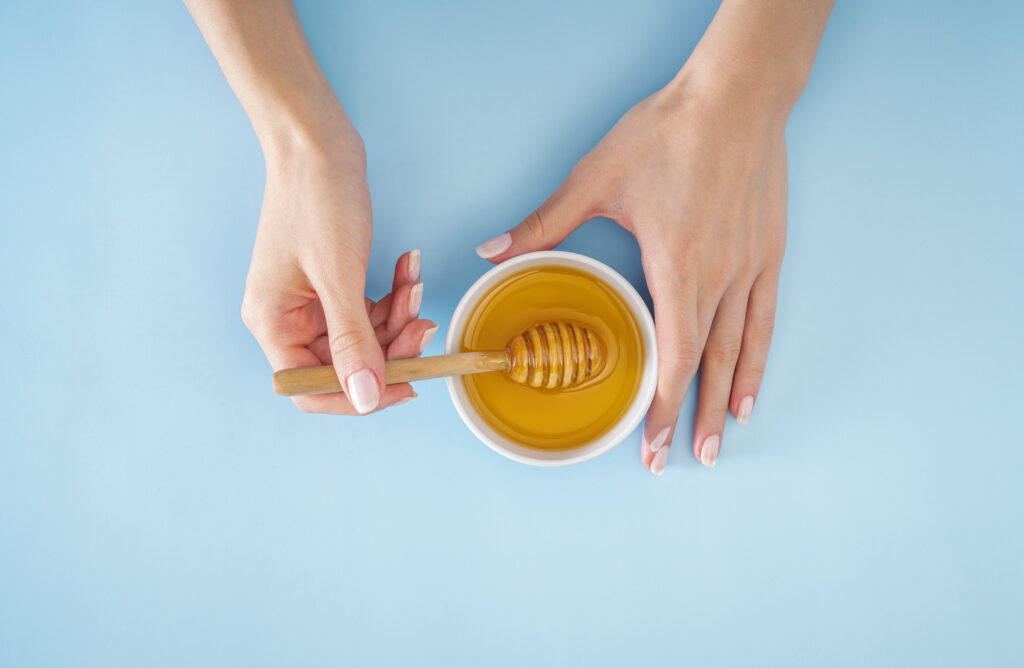Amidst the plethora of dietary advice available nowadays, one topic crops up time and time again: sugar!
We receive a lot of questions about sugar and its effect on gut health here at Chuckling Goat. It will come as no surprise to hear that excessive consumption of sugar can disrupt the balance of beneficial bacteria in your gut microbiome (moderation is key!). But with over 60 different names for sugar on the market, it’s easy to get lost.1https://www.webmd.com/diet/what-to-know-about-different-types-names-sugar
Understanding the different types of sugar can be instrumental in supporting your journey towards a happy and healthy gut. Keep reading to find out more, including guidance on intake, natural alternatives – and is honey really better?
What is sugar?
Sugar is a type of “simple” carbohydrate that provides energy for your body. Simple carbohydrates are those that are quickly and easily digested by the human body. Sugars can be divided into monosaccharides, disaccharides and polysaccharides. There are different types of sugar and they typically end in “-ose”, for example, glucose.2https://www.webmd.com/diet/what-to-know-about-different-types-names-sugar
Monosaccharides
Monosaccharides are the simplest form of carbohydrate and are often termed “single” sugars (“mono-” meaning one). Examples include:
- Glucose – this type of sugar is the primary source of energy for your body. It circulates through your bloodstream providing energy.
- Fructose – found naturally in fruits and honey, fructose is a natural sugar. It is often added to foods and beverages as a sweetener.
- Galactose – typically found in dairy.
Disaccharides
Disaccharides are formed by two monosaccharides joining together (“di-” meaning two). Examples include:
- Lactose – comprised of glucose and galactose, found in dairy products such as milk.
- Sucrose – comprised of one glucose and one fructose molecule, often referred to as “table sugar”.
What is the difference between “natural” and “added” sugars?
Natural sugars
These sugars are naturally present in foods, like dairy products (lactose) and fruits (fructose). While too much sugar can be bad for you, consuming fruit provides your body with a host of essential nutrients and fibre. Fibre slows down the release of sugars into your bloodstream providing longer lasting energy. As with anything, moderation is key.
Added sugars
These are sugars added to foods and beverages during processing and preparation. Classic examples include sugary drinks, sweets, pastries, cakes and other processed foods, even savoury (check the labels!). Excessive consumption has been linked to conditions such as obesity and an increased risk of diseases like type 2 diabetes mellitus and cardiovascular disease.3https://www.webmd.com/diet/what-to-know-about-different-types-names-sugar
How much sugar is ok?
The NHS recommend adults eat no more than 30g of “free” sugars per day (note that this is a guiding upper limit – not a target!).4https://www.nhs.uk/live-well/eat-well/food-types/how-does-sugar-in-our-diet-affect-our-health/#:~:text=This%20means%3A,day%20(5%20sugar%20cubes).
“Free” sugars are those added to foods and drinks and those found in honey and syrups, fruit and vegetable juices as well as smoothies. Sugars found in fruit, vegetables and milk are not counted as free sugars.5https://www.nhs.uk/live-well/eat-well/food-types/how-does-sugar-in-our-diet-affect-our-health/#:~:text=This%20means%3A,day%20(5%20sugar%20cubes).
What about honey?
Honey is popular natural sweet alternative for sugar. While it has some beneficial antibacterial and antioxidant properties, honey should be consumed in moderation as it can affect blood sugar levels like any other form of sugar can.6https://www.ncbi.nlm.nih.gov/pmc/articles/PMC5424551/
Read more about honey and other natural sweeteners here. Check out these 10 tips for reducing your sugar intake and curbing those cravings!
Any questions? Contact one of our Nutritional Therapists via live chat, we’re available on weekdays from 8am to 8pm.
References
- 1
- 2
- 3
- 4
- 5
- 6















